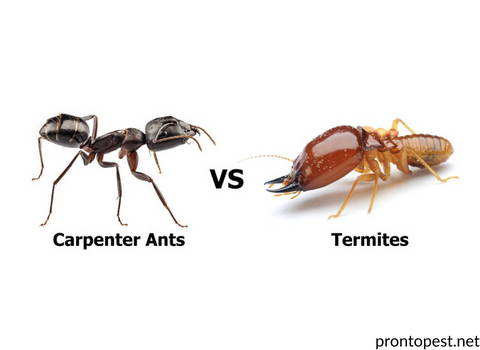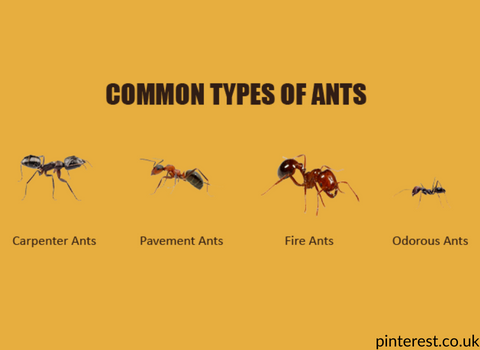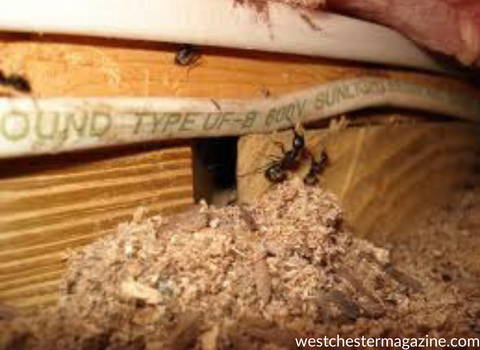What Do Carpenter Ants Look Like?
There are more than 12,000 ant species across the globe. Yes, there is a lot of ants, but there is only a handful of these species that make household pests. This means that when trying to identify how home carpenter ants look like, there are a couple of points that will help you distinguish them from other species.
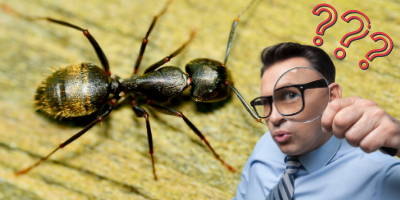
Identifying a Carpenter Ant
Among the different species of ants that you will find crawling around your home, you will most likely find carpenter ants in the largest number. There are a few points that you should keep in mind when it comes to proper carpenter ants identification.
Length and Body Structure
Their length can be around 6mm to about 12mm. Since it may be difficult to tell the difference with size alone, you should also look closely at their body structure.
Look at the abdomen and thorax closely. The waist of carpenter ants has a single node unlike other ants like little black ants, acrobat ants, pavement ants, and pharaoh ants that have two nodes. However, there are also other species with a single node such as large yellow ants, crazy ants, field ants, and odorous house ants.
If you cannot tell carpenter ants from other ants using these characteristics, you can try to look at the thorax of the ants you find in your home. Unlike other ants with unevenly shaped thorax, carpenter ants have rounded thorax.
The colouring is also an interesting characteristic of carpenter ants. They can be reddish-brown, or some are entirely black, which is why they are mistaken as little black ants. Some species have a reddish colour.
Differentiating Carpenter Ants from Termites
When it comes to the proper identification of carpenter ants, you might also encounter a problem with differentiating them from termites. This is a common problem with people who find chewed wood on some parts of their home or holes in wooden parts of their home.
You need to know whether the cause of the wood damages is from termite swarmers or carpenter ant swarmers.
Most termite species produce swarmers with black bodies, which may lead you to believe that you only have carpenter ant swarmers. However, you should be aware of the difference in size to know the insect you are looking at.
Carpenter ant swarmers are larger than those of the termites. Regardless of the type of termites that you found they will always fit into the face of a dime. On the other hand, carpenter ant swarmers will always be larger than the size of a dime.
How to Know If You Have Carpenter Ants or Regular Ants?
Carpenter ants are from the genus Camponotus and are known as polymorphic. It means that these species have workers that are of different sizes in their colony. The ant colony usually has one wingless queen.
Winged carpenter ants usually appear after two years in the colony. Ant workers of these species are often in black and red, dark brown, black, and red or yellow coloration. While black carpenter ants have black and dark brown colours, black and red carpenter ants have these black and dark brown bodies with a red-brown coloured thorax.
Carpenter ant eggs are cream coloured and oval-shaped. The larvae are legless and transform into adults during the pupal stage.
As mentioned, you can tell the difference between carpenter ants from other ants by their colour as well as their body structure. An additional characteristic that you should keep in mind is that they have circles of hairs around their anus and their head is the shape of a heart. All of which can be seen under magnification.
Signs of Carpenter Ant Infestation in Your Home
Carpenter ants can damage any wood structure where they have built their nest. When left untreated, a carpenter ant infestation can become severe. They may eventually create satellite nests, which means you have more ants to kill and more coverage to treat.
It is exceedingly rare for these ants to nest in dry wood. Points of entry in cracks, foundations, electric wires, attic vents, telephone lines, and pipes should be tracked when dealing with indoor infestations.
Carpenter ants prefer staying in structural lumber like hollow doors, wall voids, foam panels, and windows. They seek wood that has been softened by decay, moisture, or other insects.
Ant Workers Inside Your Property
An obvious sign of an infestation is the sight of workers inside your home or building. However, this alone is not enough to tell that they have already established their nest inside your home. This is because carpenter ants can forage for food even at great distances from their nests.
Piles of Wood Shavings
A sign of a severe infestation is the presence of wood shavings in piles. You will usually find this under wooden items. What carpenter ants do is burrow into the wood and create nests.
Rusting Sounds
Another sign of an infestation is when you try to knock on the wall or any woodwork and hear a faint rustling sound. Knocking on the woodwork or wall will disturb the carpenter ants, which will cause the sounds.
The Sight of Large Winged Ants
You should be wary of large-winged ants that may emerge from the walls, ceilings, and hidden crevices. This is a certain sign that there is an infestation going on in your building or home.
Reminder: Just a quick reminder, flying ants can be any species. They are not identified as a species of ants but a caste of ants. Whenever ant colonies mature, they will start producing winged male and female reproductive or swarmers. They leave the nest and will start their new nest in another place.
Pest Control Methods to Get Rid of a Carpenter Ant Infestation
There are different pest control methods that you can do to get rid of carpenter ants on your property.
Baits
Baits are considered natural pesticides for these ants. They appear to be sugary baits that are placed near ant trails to and from their nests. The bait is then brought back by worker ants to their nest and distributed to everyone in the nest including the queen.
As a result, the entire colony will die in days. However, the effectiveness of baits may depend on the location of separate satellite nests. It may take longer than usual because the workers will have to carry the bait back to the separate colonies.
Boric Acid
Another way to remove these pests from your home is by buying boric acid. This is among the readily available store-bought products that you can use to control different ant species, especially carpenter ants.
For this to be effective, you should follow the mixture as stated on the label. When administered incorrectly, natural pesticides may fail to eradicate an entire ant colony.
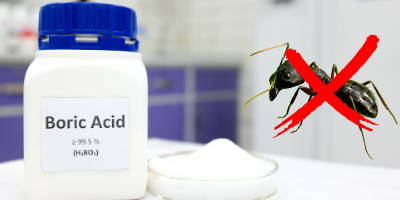
When to Call a Professional
Due to potential structural damage and satellite nests, it is recommended that you contact a pest control service when dealing with an infestation. Pest control experts can combine the use of nonchemical and chemical solutions to make sure that eggs, larvae, workers, and the queen are exterminated from your property.


